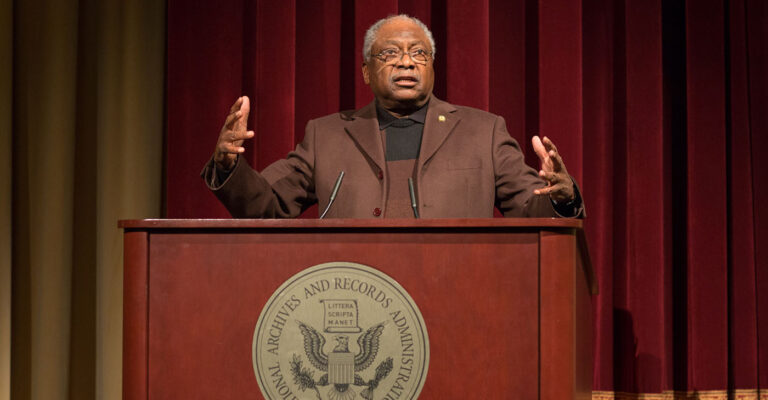Special to the NNPA
By U.S. Congressman James E. Clyburn
Black History Month is a time to celebrate the giants that came before us and reflect on the shoulders upon which we stand. I am reminded of Lewis Latimer, the son of former slaves, whose invention of the filament allowed Thomas Edison’s lightbulb to function properly. I am reminded of Septima Poinsette Clark, a South Carolinian who Martin Luther King called the mother of the civil rights movement, whose workshops inspired icons like Rosa Parks. And I’m reminded of Robert Smalls, who I sincerely believe is the most consequential South Carolinian who ever lived. While enslaved, he absconded a Confederate boat, freed his family and friends, campaigned for Blacks to be allowed to fight for the Union army, and later became a member of the South Carolina legislature and Congress.
As a former history teacher and student of history, I’m deeply concerned by the dark efforts at work to silence these stories. The NAACP Legal Defense Fund estimates that more than 1,600 books have been banned across the country, with 566 books having been banned in Florida alone. Teachers and librarians are living in fear of triggering the next battle of the ongoing culture war as they simply try to do their job.
These efforts are directly connected with widespread attempts to take control of local school boards. In 2022, several new board members — who had the support of right-wing activist group “Moms for Liberty” — were sworn into the Berkeley County School District in South Carolina. Within two hours, the board had fired the district’s first Black superintendent, removed the district’s lawyer, banned “critical race theory,” whatever that is, and put the framework in place to ban various books from schools.
Other school districts in South Carolina followed suit — Clarendon, Charleston, Colleton, and Sumter — and have come under fire within the last year. They are all led by Black superintendents. These are coordinated actions not intended to support the education of our children, but to further a political agenda sponsored by “Moms of Liberty” and various other ultra-right wing MAGA groups.
The dangers of continuing down this path are too great to ignore. I often quote philosopher George Santayana who once said, “Those who cannot remember the past are condemned to repeat it.” Based on the recent events unfolding across my home state which gave birth to Brown v. Board of Education, it’s clear we are already headed in that terrifying direction.
It is a common myth that the origins of the Christian right can be traced back to the 1973 U.S. Supreme Court decision in Roe v. Wade. As the story goes, religious conservatives were so deeply disturbed by the possibility of the legalization of a woman’s right to choose that they mobilized, eventually garnering the attention of President Richard Nixon. President Nixon then used the issue as a cornerstone of his 1972 presidential campaign.
However, it was the issue of school desegregation in the 1950s and ‘60s that unified the bloc. The 1954 Brown v. Board of Education decision sent shockwaves throughout the country, particularly in the South where Jim Crow flourished, and segregation was the dominating way of life. In response to Brown, white residents established racially segregated private schools to avoid complying with the ruling. Notably, most of these schools were religiously affiliated.
Black families joined together in the successful 1971 Green v. Connally class action suit to prevent the institutions from being granted tax-exempt status and to ensure no one could receive tax deductions for contributing to such schools. Tensions were further inflamed in 1975 when the IRS revoked the tax-exempt status of Bob Jones University, a racially segregated evangelical Christian institution.
Today, this same Christian right has rebranded and united with MAGA Republicans to remove Black history books from our schools, strip women of their right to choose, and end the miracle of IVF.
Each of these efforts are intertwined with the generations of discrimination that the African American community has experienced. Yes, the civil rights movement of the 50’s and 60’s was a complex struggle for justice and equality for the Black community. But I reflect on Dr. Martin Luther King, Jr.’s prescient words in his famed “I Have a Dream” speech, that “[Our white brothers] have come to realize that their freedom is inextricably bound to our freedom. We cannot walk alone.”
As the son of a fundamentalist minister and Chairman of the Democratic Faith Working Group in Congress, I lean heavily on my faith in challenging times. Matthew 25:40 teaches us that “whatever you did not do for one of the least of these, you did not do for me.” It may be easy to turn a blind eye when the injustices do not impact you. But the scripture assures that we will “reap what [we] sow.”
Our stories — Black stories — should and must be told.
The post COMMENTARY: Black History Month and the Importance of Telling Our History first appeared on BlackPressUSA.





